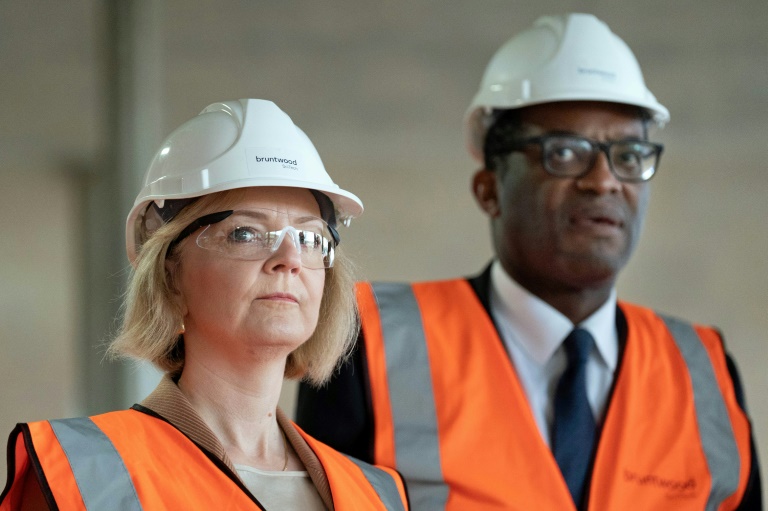UK Prime Minister Liz Truss and her finance minister Kwasi Kwarteng are under pressure due to their announcement for unfunded tax cuts
Britain’s Prime Minister Liz Truss defended her contentious plan to kick-start economic growth through tax cuts, despite expectations Tuesday of a second damaging U-turn.
Fresh from a humiliating climbdown on cutting income tax for the richest, Truss and Chancellor of the Exchequer Kwasi Kwarteng were set to bring forward a major debt reduction plan, the Financial Times and others reported.
Its unveiling will come later this month rather than on November 23, and will be accompanied by independent forecasts from the Office for Budget Responsibility (OBR) in a bid to calm febrile financial markets, the reports said.
The government declined to confirm the reports, as Truss and Kwarteng endured another difficult day at the ruling Conservatives’ annual conference in Birmingham, central England.
But Mel Stride, the Tory chairman of the powerful Treasury committee in the House of Commons, said: “I have pressed the chancellor very hard on this and to his credit he has listened.”
Acting in advance of the Bank of England’s next rate-setting meeting on November 3 could “reduce the upward pressure on interest rates to the benefit of millions of people up and down the country”, he added.
Asked if any more U-turns were coming, Truss was evasive in an interview with LBC radio broadcast Tuesday but recorded on Monday.
“I’m determined to carry on with this growth package,” she said, stressing another component of the plan to cap soaring energy bills.
“That’s what’s important, but it’s also important that we do listen to people and we bring the country with us.”
– ‘Get a grip!’ –
Truss refused to rule out cuts to benefits as poorer Britons struggle with the worst cost-of-living crisis in generations.
“I’m very committed to supporting the most vulnerable,” Truss told BBC radio in another pre-recorded interview aired Tuesday.
But she added: “We have to look at these issues in the round. We have to be fiscally responsible.”
Potential cuts to the welfare budget are shaping up as the next battle with dissident Tory MPs after the aborted tax cut, part of a package that relies on billions more in new borrowing.
Splits have also emerged in the cabinet.
Senior minister Penny Mordaunt, one of the candidates Truss beat in the Tory leadership race, said it “makes sense” that welfare should still rise in line with soaring rates of inflation.
“That’s what I voted for before, and so have a lot of my colleagues,” she told Times Radio.
Media coverage of Monday’s volte-face was damning, with many commentators arguing Truss’s credibility was already in tatters less than a month since she succeeded Boris Johnson.
The Daily Mail newspaper, normally a trenchant voice in support of the new leader’s right-wing agenda, headlined its main story: “Get a grip!”
– Kwarteng’s quips –
Coverage of Kwarteng’s lacklustre speech to the Tory conference on Monday, which had to be rapidly rewritten after the tax plan was ditched, was also damning.
There was particular criticism of the finance minister’s jocular tone, which he reinforced at an evening reception with the Policy Exchange think-tank.
Market reactions that saw the pound slump to an all-time low against the dollar last week had been “hullabaloo”, he said.
Policy Exchange, he also told his laughing hosts, was “twice as old as the OBR — that gives you huge authority”.
Dissident ringleader Michael Gove kept up criticism of Truss on Tuesday, stressing all Conservative MPs had been elected on Johnson’s manifesto of 2019.
It included a pledge to end arbitrary evictions of tenants by private landlords, he noted at a conference fringe event held by the housing charity Shelter.
“We’ve got to keep faith with what Boris wanted, we’ve got to make sure that manifesto commitment is honoured,” Gove said, after Truss reneged on a Johnson commitment to ban fracking.
But asked by reporters if Truss would survive past the end of the year, the former minister said: “Yes.”
Shelter presented poll findings that suggested private renters who voted Tory in 2019 are deserting the party in droves for Labour and other opposition parties.
Conservative seats at risk in the MRP poll included Johnson’s own constituency in west London.
Wider opinion polls in recent days have shown Labour breaching 50 percent as the Tories slump under Truss, raising the stakes as she prepares to close the Birmingham conference on Wednesday.










